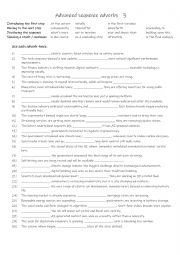
|
7 Advanced sequence adverbs 3
First, students need to familiarise themselves with the 7 adverbs. Then they read the sentences to work out which one is needed to complete the gap-fill. Each adverb is used 3 times! Answers on page 2
Level: advanced
Age: 12-100
Type:
Downloads: 130
|
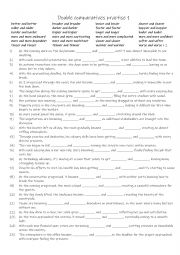
|
B1+-B2 25 double comparatives - Part 1
Double comparatives are used to describe a situation where something increases or decreases progressively. By repeating the comparative form, we emphasise how the quality or action becomes more extreme. This structure is common in English, and learning it can help express change in a dynamic and descriptive way. Native speakers use double comparati...
Level: intermediate
Age: 10-100
Type:
Downloads: 108
|
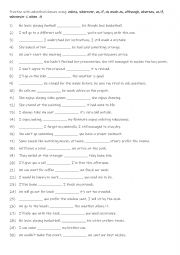
|
A2+-B1 Adverbial clauses 4
Learning adverbial clauses using words like unless, wherever, as, if, as much as, although, whereas, as if, whenever and when helps students express complex relationships between ideas, such as condition, time, contrast, and manner. First, students need to familiarise themselves with the 10 adverbial clauses and their use. Then they read the senten...
Level: intermediate
Age: 10-100
Type:
Downloads: 118
|
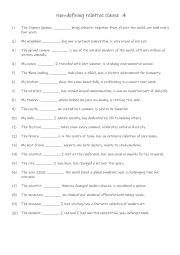
|
Non-defining relative clause 4
Students complete the gap-fill with the correct word. Answers on page 2.
Level: elementary
Age: 8-100
Type:
Downloads: 112
|
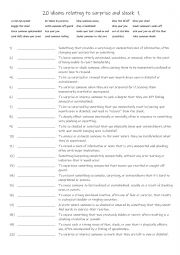
|
B1+-C1 20 Idioms relating to surprise and shock 1
First, students need to familiarise themselves with the 20 idioms and expressions and their meanings. Then they read the definitions to see which one is being described and write that word in the space provided Answers on page 2.
Level: intermediate
Age: 12-100
Type:
Downloads: 105
|
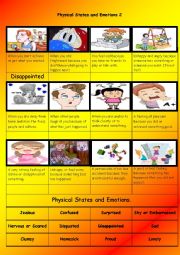
|
Physical States and Emotions Part 2 of 4
Students read the physical state or emotion description then match it to the correct feeling. Part 2 of 2.
Level: elementary
Age: 8-100
Type: worksheet
Downloads: 264
|
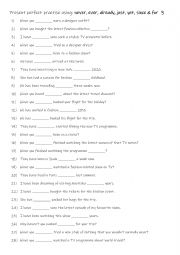
|
A2+-B1 Present perfect practise using never, ever, already, just, yet, since & for 3
First, students need to familiarise themselves with adverbs and their use. Then they read the sentences to see which one is needed to complete the gap-fill. Answers on page 2.
Level: intermediate
Age: 8-100
Type:
Downloads: 116
|
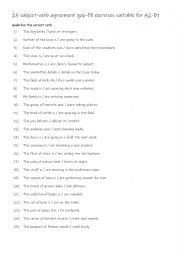
|
25 subject-verb agreement gap-fill exercises suitable for A2-B1
25 subject-verb agreement gap-fill exercises suitable for A2-B1. Students underline the correct verb. Answers with explanations are given on page 2.
Level: intermediate
Age: 14-100
Type:
Downloads: 104
|
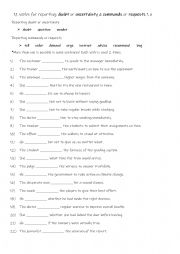
|
11 verbs for reporting doubt or uncertainty & commands or requests 1a
First, students need to familiarise themselves with the 11 verbs and check their meaning. Then they read the sentences to see which one is needed to complete the sentence. Each word is used 2 times! Answers on page 2.
Level: elementary
Age: 9-100
Type:
Downloads: 113
|
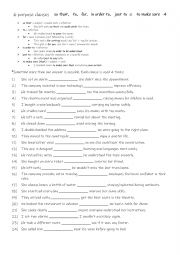
|
A2+-B1 6 clauses of purpose 4
First, students need to familiarise themselves with the 6 clauses of purpose and their formation. Then they read the sentences to see which one is suitable to complete the gap-fill. Each type is used 4 times! Answers on page 2.
Level: elementary
Age: 8-100
Type:
Downloads: 105
|












